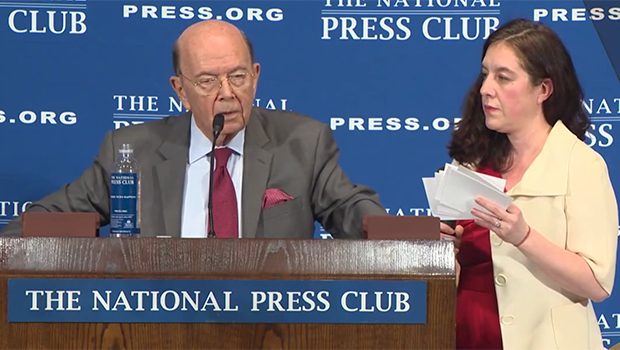U.S. Commerce Secretary Wilbur Ross shorted stock in a Kremlin-linked shipping firm days after reporters working on the Paradise Papers informed him that they were about to reveal his holdings in the firm, according to a new report by Forbes.
While serving as Commerce Secretary, Ross had retained a financial stake in the shipping firm Navigator Holdings, which earns tens of millions of dollars each year from a Russian energy company owned by oligarchs sanctioned for their close ties to President Vladimir Putin. On November 5, 2017, the International Consortium of Investigative Journalists and media partners around the world revealed this connection when they published the Paradise Papers investigation.
Today’s story by Forbes shows that Ross took a short position on Navigator stock soon after reporters reached out to him for comment – positioning him to profit from the advance notice of a potentially damaging media story.
ICIJ spent more than six months researching Ross as part of the Paradise Papers investigation, working closely with media partners including the New York Times. On Oct. 26, 2017, New York Times investigative reporter Mike McIntire sent a letter to the U.S. Department of Commerce requesting comment from Ross on behalf of the Paradise Papers team.
In the days before publication, McIntire corresponded with Commerce Department officials and received a statement from the department on Nov. 1. The statement did not dispute the main findings of the story and said that Ross “works closely with Commerce Department ethics officials to ensure the highest ethical standards.”

It turns out that the Commerce Secretary had been busy in the days after receiving the letter.
On Oct. 31 – the day before the Commerce Department’s statement was sent to the New York Times but not yet public – Ross took out a short position in Navigator stock valued between $100,001 and $250,000, Forbes reported.
One of the most incredible things about Wilbur Ross’ hidden filings is just how clear they are that he shorted Navigator holdings just before negative stories came out about his ties to the company. They just lay it out in perfectly plain English. pic.twitter.com/w6EgQrBxsL
— Dan Alexander (@DanAlexander21) June 18, 2018
Taking a short position on a stock is to bet that the value of the stock will decrease. Ross’ move meant that if Navigator shares went down after publication of the Paradise Papers, he could cash out with a gain. Navigator stock declined four percent in the 11 days before Ross exited his short position with an apparent profit, according to Forbes.
Ross had previously served on the board of Navigator Holdings and his private equity firm, the WL Ross Group, had long been its largest shareholder.
Federal law prohibits government officials from using information obtained by reason of federal employment for private gain. If an official obtains such information and knows that is not available to the general public, they are prohibited from profiting from it, said Virginia Canter, the Chief Ethics Counsel for the watchdog group Citizens for Responsibility and Ethics in Washington.
“The Office of Government Ethics have certified that the transactions documented are in compliance with federal ethics requirements,” a spokesman for the Commerce Department told ICIJ.
The federal disclosure forms revealing Ross’ short position with Navigator were posted today by the Office of Government Ethics, he added.
Shortly after the publication of the Paradise Papers, Ross pledged to divest his shares in Navigator Holdings. In December, Commerce Department spokesman James Rockas told ICIJ that Ross “has now completed the process he began months ago of divesting” from Navigator.
Neither Ross nor the Commerce Department has provided ICIJ with documentation of this divestment. In April, Rockas told ICIJ that Ross’ interest in the companies “was divested through a transfer to an irrevocable trust,” a transaction which is not subject to federal financial disclosure regulations.
In May, an ICIJ reporter asked Ross at an event at the National Press Club why he had retained his investments in Navigator for nearly a year after taking his cabinet post in light of the company’s dealings with sanctioned Russian oligarchs.
“The Office of Government Ethics did not require the sale of these holdings,” Ross said. And since the Russian company owned by sanctioned oligarchs was not itself sanctioned, Ross added, “there was no reason not to hold it.”






